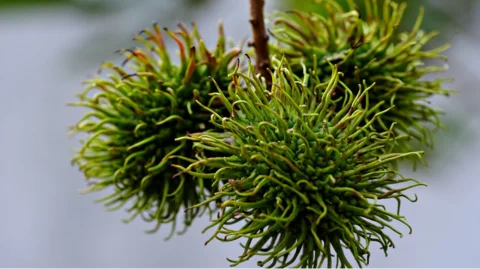About Rambutan Fruit Benefits
Rambutan is a tropical Fruit native to southeast Asia. It belongs to the family sapindaceae, includes lychee and longan. The fruit is known for its distinctive appearance, With a hairy outer skin and juicy, translucent flesh inside. Here are some potential health benefits of rambutan fruit:
Rich in Nutrients:
Rambutan is considered rich in nutrients. It provides a range of essential vitamins and minerals that contribute to overall health. Here are some key nutrients found in rambutan benefits:
Vitamin A: Rambutan contains vitamin A, which is important for maintaining healthy skin, vition, and immune function. The statement ” It also plays a role in promoting proper organ function” likely refers to the fact that the nutrients present in rambutan, such as vitamins and minerals, play a crucial role in supporting the proper functioning of various organs in the human body. These nutrients are essential for maintaining overall health and well- being, contributing to processes like immune function, blood circulation, bone health, and other vital physiological functions.
Vitamin C: Rambutan is a good source of vitamin C, an essential antioxidant that supports the immune system, helps in collagen synthesis for healthy skin, and contributes to the overall well-being of the body.
Calcium: Rambutan fruit contains calcium, which is important for bone and teeth health. Calcium also plays a role in muscle function, blood clotting, and nerve transmission.
Potassium: This mineral is vital for maintaining proper heart and muscle function, regulating blood pressure, and supporting overall cardiovascular health. Rambutan fruit provides a moderate amount of potassium.
Iron: Rambutan fruit contains iron, a crucial component for the production of hemoglobin in red blood cells. Adequate iron intake helps prevent anemia and ensures proper oxygen transport in the body.

Dietary Fiber: Rambutan is a good source of dietary fiber, promoting digestive health. Fiber aids in maintaining regular bowel movements, preventing constipation, and supporting a healthy gut.
Phosphorus: Phosphorus is essential for bone health, as it plays a key role in the formation and maintenance of strong bones and teeth. Rambutan contributes to the phosphorus content in the diet.
Antioxidant Properties:
Rambutan fruit possesses antioxidant properties due to the presence of various compounds, such as carotenoids and flavonoids. Antioxidants are substances that help neutralize free radicals in the body, thereby protecting cells from oxidative stress. Here’s how the antioxidant properties of rambutan can benefits human health:
Free Redical Neutralization: Rambutan’s antioxidants work to neutralize free redicals, which are unstable molecules that can damage cells and contribute to aging and various diseases, including cancer.
Anti-Inflammaroty Effects: Some antioxidants in rambutan may have anti-inflammatory effects, helping to reduce inflammation in the body. Chronic inflammation is linked to various health problems, and antioxidants contribute to managing this inflammatory response.
Reduced Oxidative Stress: Antioxidants in rambutan help reduce oxidative stress, a condition where there is an imbalance between free radicals and the body’s ability to neutralize them. Chronic oxidative stress is associated with several health issues, and antioxidants play a role in mitigation this imbalance.
Cellular Protection: Antioxidants protect cellular structures, including DNA, lipids, and proteins, from oxidative damage. This protection is essential for maintaining the integrity and proper functioning of cells.
Cardiovascular Health: Antioxidants contribute to cardiovascular health by preventing oxidative damage to blood vessels and reducing the risk of atherosclerosis. They also play a role in maintaining cholesterol levels.
Cancer Prevention: While more research is needed, some studies suggest that the antioxidants in fruits like rambutan may have popential anti-cancer properties by inhibiting the growth of cancer cells. This area of research is ongoing, and no specific food can be considered a cure or treatment for cancer.
Immune System Support: Antioxidants, including vitamin C present in rambutan, support the immune system by promoting the production of white blood cells and enhancing the body’s ability to defend against infections.
Boosts Immunity:
Rambutan benefits is know to contribute to immune system support, Primarily due to its high vitamin C content. Here’s how rambutan can boost immunity:
Vitamin C Boost: Rambutan is a rich source of vitamin C, a potent antioxidant that plays a crucial role in supporting the immune system. Vitamin C is know to stimulate the production of white blood cells, which are essential for defending the body against infections and foreign invaders.
Antioxidant Defense: The antioxidants in rambutan, including vitamin C, help neutralize free redicals in the body. By reducing oxidative stress, these antioxidants contribute to a healthier immune system, as chronic oxidative stress can compromise immune function.
Enhanced Immune Response: Vitamin C supports the immune response by promoting the production and function of antibodies, which play a key role in recognizing and neutralizing pathogens like bacteria and viruses.
Reduced Duration of Illness: Adequate vitamin C intake, obtained from sources like rambutan, has been associated with a shorter duration of illnesses such as the commom cold. It may not only help prevent infections but also reduce the severity and duration of symptoms when illnesses do occur.
Improved Wound Healing: Vitamin C is essential for collagen synthesis, a protein that plays a crucial role in wound healing. By supporting the body’s ability to repair tissues, rambutan can indirectly contribute to overall immune function.
Aids Digestion:
Rambutan offers potential digestive benefits due to its fiber content. Here’s how it aids digestion:
Dietary Fiber: Rambutan is a good source of dietary fiber, including both soluble fibers. Dietary fiber is crucial for keeping the digestive system healthy.
Regulation of Bowel Movements: The fiber in rambutan helps add bulk to the stool, promoting regular bowel movements. The can prevent constipasipation and contribute to a healthy digestive rhythm.
Prevention of Digestive Issues: Adequate fiber intake is associated with a lower risk of various digestive issues, including diverticulitis and hemorrhoids. Fiber helps maintain the health of the digestive tract and supports proper functioning.
Gut Health: The soluble fiber in rambutan may also serve as a prebiotic, promoting the growth of beneficial gut bacteria. A healthy balance of gut microbiota is linked to improved digestion and overall well-being.
Nutrient Absorption: Fiber can slow down the absorption of nutrients in the digestive tract, promoting more gradual and steady absorption. This can be beneficial for individuals with conditions such as diabetes, as it may help stabilize blood sugar levels.
Weight Management: Higi-fiber foods like rambutan can contribute to a feeling of fullness, potentially aiding in weight management by reducing overall calorie intake.
It’s important to consume a variety of fiber-rich foods as part of a balanced diet to support optimal digestive health. It’s equally crucial to stay hydrated, as fiber absorbs water and requires sufficient fluid intake for effective functioning. While rambutan can be nutritious addition to your diet, a holistic approach to digestive healthincludes a combination of fiber- rich foods, hydration, and other healthy lifestyle practices.
Hydration:
Rambutan contributes to hydration due to its high water content. Here’s how it can be beneficial for maintaining hydration in the human body:
Water Content: Rambutan is composed mainly of water, which makes it a hydrating fruit. Staying adequately hydrated is essential for various bodily functions, including temperature regulation, nutrient transportation, and overall cellular activities.

Electrolyte Balance: In addition to water, rambutan contains electrolytes like potassium. Electrolytes are crucial for maintaining the balance of fluids in and out of cells, supporting proper muscle function, and ensuring efficient nerve transmission.
Quenching Thirst: The juicy and hydrating nature of rambutan makes it a refreshing snack, helping quench thirst and providing a natural way to stay hydrated, especially in hot climates or during physical activities.
Overall Hydration Support: While water remains the primary source of hydration, incorporating water-rich foods like rambutan into the diet can contribute to overall fluid intake. This is particularly beneficial for individuals who may struggle to consume enough water throughout the day.
Potential Anti-cancer Properties:
Research on the potential anti-cancer properties of rambutan is still in its early stages, and conclusive evidence is limited. Some studies suggest that certain compounds found in rambutan may exhibit properties that could be beneficial in preventing or inhibiting the growth of cancer cells. Here are some points to consider:
Antioxidant Content: Rambutan is rich in antioxidants, including flavonoids and polyphenols. These compounds have been studied for their potential to neutralize free radicals and reduce oxidative stress, which is associated with the development of cancer.
Anti-Inflammatory Effects: Chronic inflammation is connected to the initiation and advancement of cancer. Some compounds in rambutan may have anti-inflammatory effects, potentially contributing to the prevention of cancer.
Tumor Growth Inhibition: In laboratory studies, certain extracts from rambutan have shown inhibitory effects on the growth of cancer cells. These findings suggest that specific compounds in rambutan may have the potential to suppress the proliferation of cancer cells.
Apoptosis Induction: Apoptosis is a natural process of programmed cell death the helps eliminate damaged or abnormal cells. Some research indicates that rambutan extracts may induce apoptosis in cancer cells, potentially preventing the uncontrulled growth that characterizes cancer.
Skin Health:
Rambutan can contribute to skin health due to its nutritional content, particularly its rich vitamin C content and other beneficial compounds. Here’s how rambutan may benefits skin health:
Vitamin C for collagen Synthesis: Vitamin C is crucial for the synthesis of collagen, a protein that provides structure to the skin. Collagen helps maintain skin elasticity, firmness, and overall integrity. Regular consumption of rambutan, which is high in vitamin C, can support collagen production and contribite to healthier skin.
Antioxidant Protection: Rambutan contains antioxidants, including vitamin C and other compounds, which help protect the skin from oxidative stress caused by free redicals. Antioxidants neutralize free radicals, preventing damage to skin cells and reducing signs of premature aging, such as wrinkles and fine lines.
Hydration: The high water content in rambutan contributes to overall hydration, which is essential for maintaining skin moisture. Well-hydrated skin appears more plum, youthful, and can be more resistant to dryness and irritation.
Wound Healing: Vitamin C in rambutan also plays a role in wound healing. It supports the formation of new connective tissue, aids in tissue repair, and contributes to the overall healing process. Including rambutan in the diet may assist in maintaining healthy skin and facilitating recovery from wounds or injuries.
Protection Against UV Damage: Antioxidants in rambutan may offer some level of protection against the harmful effects of ultraviolet (UV) radiation from the sun. While not a substitute for sunscreen, incorporating antioxidant-rich foods like rambutan into the diet may complement sun protection efforts and help minimize UV-induced damage.
Regulates Blood Sugar:
Rambutan may have potential benefits in controlling blood sugar levels, primarily due to its dietary fiber content and other nutrients. Here’s how rambutan can play a role in blood sugar control:
Dietary Fiber: Rambutan is a good source of dietary fiber, including both soluble and insoluble fiber. Dietary fiber can help slow the absorption of sugar into the bloodstream, preventing a ripid rise in blood glucose levels after a meal. This can contribute to maintaining more stable and controlled blood sugar levels.
Improved Insulin Sensitivity: Some research suggests that dietary fiber can increase insulin sensitivity, allowing cells to respond better to insulin and take up glucose more efficiently. Improved insulin sensitivity is associated with improved blood sugar control.
Polyphenols and Antioxidants: Rambutan contains polyphenols and antioxidants, which may contribute to improving overall metabolic health. These compounds may contribute to reducing inflammation and oxidative stress, which can affect insulin resistance and blood sugar regulation.
Low Glycemic Index: Foods with a low glycemic index (GI) are know to have a small effect on blood sugar levels. Although the specific GI value for rambutan can very, its natureal sugar fiber, and water content may contribute to its relatively low glycemic impact.
As rambutan may offer potential benefits for blood sugar control, people with diabetes or those at risk for diabetes should make dietary choices that are widely accepted. Rambutan a balanced diet, regular physical activity and other lifestyle factors also play an important role in overall blood sugar control and metabolic health.
Conclusion
Rambutan is a tropical fruit with a variety of potential healthy benefits. Rich in essential nutrients, antioxidants, and dietary fiber, it offers a well-rounded nutritional profile that may positively impact overall well-being. The potential health benefits of rambutan include supporting immunity, aiding digestion, promoting hydration, contributing to skin health, and possibly possessing anti-cancer properties.
The rambutan fruit high vitamin C content is noteworthy for its immune-boosting effects, while the presence of antioxidants may play a role in reducing oxidative stress and supporting skin health. The dietary fiber in rambutan is beneficial for degestive health and may contribute to the regulation of blood sugar levels, making it potentially suitable for individuals with diabetes or those at risk of the condition.
While existing studies suggest potential anti-cancer properties due to the fruit’s antioxidant content, further research is needed to establish conclusive evidence in this regard. It’s important to note that while rambutan can be a nutritioos addition to a balanced diet, a holistic approach to health, including a varied diet, regular exercise, and other healthy lifestyle practices, remains crucial for overall well-being.

